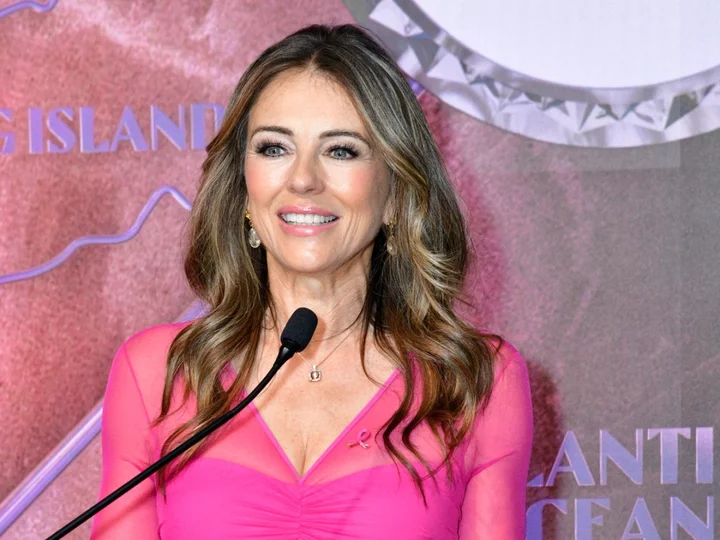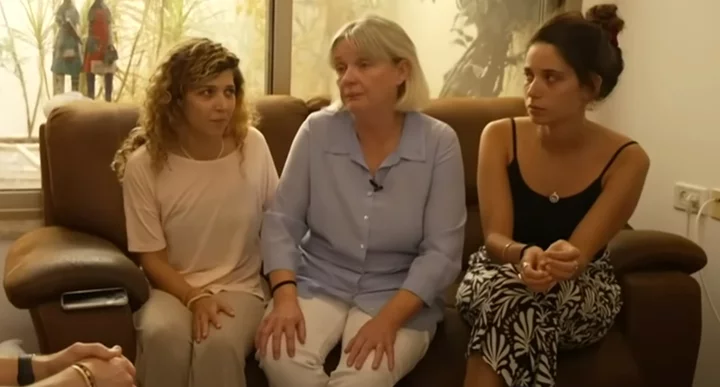
Elizabeth Hurley issues reminder to women about getting mammograms as she raises awareness about breast cancer
Elizabeth Hurley has issued a reminder to women about getting mammograms, in honour of her partnership with Estée Lauder’s Breast Cancer Awareness campaign. The model, 58, spoke candidly about mammograms – which are X-rays performed on women’s breasts to screen for cancer – during a recent interview withUs Weekly. While discussing her last 28 years as the ambassador of Estée Lauder’s campaign, she told women that if they feel something “abnormal” when examining their bodies, they shouldn’t hesitate to get it checked by a doctor. “I think the most important thing you can do is familiarise yourself with your breasts because they’re yours and only you know how they feel,” she said. “You should recognise something when it’s abnormal, and you should go to the doctor right away.” Hurley emphasised that annual screenings for breast cancer are not only “vital,” but they should be considered a part of “looking after your health in every way”. She also went on to urge women to be “breast cancer bullies” by continuing to encourage their loved ones to get checked for the disease. “Make sure your friends, your family, your mother, your grandmother, that they’re going for their screenings regularly and urge them to self-check,” she said. “It doesn’t discriminate. It can hit anybody. Some groups are more vulnerable than others.” She also made a reference to one breast cancer that can be difficult to treat, triple-negative breast cancer, which “differs from other types of invasive breast cancer” because “it tends to grow and spread faster, has fewer treatment options, and tends to have a worse prognosis”, as noted by the American Cancer Society. The type of cancer can also be “more common in women younger than age 40, who are Black, or who have a BRCA1 mutation”. “It disproportionately affects Black women,” the Bedazzled star added. “It’s a diverse disease and it needs to be attacked in a diverse way.” According to the American Cancer Society, women between the ages of 45 and 54 “should get mammograms every year”. Meanwhile, women who are 55 and older can either “switch to a mammogram every other year, or they can choose to continue yearly mammograms”. In addition, women between the ages of 40 and 44 “have the option to start screening with a mammogram every year”. The organisation also noted that breast cancer is the most common cancer in women, with estimates of “about 297,790 new cases of invasive breast cancer” being diagnosed in women in the US in 2023. Over the years, Hurley has continued to speak about the importance of getting a mammogram. Last year, she joined Loose Women hosts Kaye Adams, Brenda Edwards, Nadia Sawalha, and Carol McGiffin for a self-examination on live TV. During the segment, she also opened up about losing her own grandmother to the disease, and how her attitudes towards breast cancer have shifted over time. “At that time nobody talked about it. There was no pink ribbon, no Breast Cancer Awareness month,” the Serving Sara star said, adding that when her grandmother first found a lump in her breast, she didn’t go to the doctor because she was “scared and embarrassed”. “When she finally went it was quite progressed. But she still never talked about it,” the model continued. “It’s still a life-threatening disease for many women, but times have changed. We talk about it now.” During her interview with Us Weekly, she went on to celebrate her 28th year with Estée Lauder’s Breast Cancer Awareness campaign, noting that Estée Lauder’s daughter-in-law, Evelyn Lauder, is the one who first asked her “to get involved” with the mission. “That’s how it started, and I’m still here. We’ve raised $118m, 93 million of which went straight to research,” she said. “The rest went to education, medical services, support groups [and more]. It’s a phenomenal achievement.” Read More Big Brother narrator Marcus Bentley: Meet the man behind TV’s most recognisable voice ‘Not guilty’: Elizabeth Hurley reacts to rumours she took Prince Harry’s virginity Elizabeth Hurley slams British Airways’ ‘dodgy service’ after getting stuck in Antigua Like Sophie Anderton, I have felt the shame of struggling to have a child of my own How to spot if your child is struggling with their mental health – and what to do next How to get rid of bedbugs: Signs and symptoms amid threat of UK invasion
1970-01-01 08:00

Irish-Israeli woman missing in Israel amid attacks
The Irish Department of Foreign Affairs says it is aware of the case and is in contact with the family.
1970-01-01 08:00

'He just wanted to act': Adam Deacon hails Ed Sheeran's approach to Sumotherhood
Adam Deacon felt that Ed Sheeran was keen to prove his acting ability with his role in 'Sumotherhood'.
1970-01-01 08:00

How to spot if your child is struggling with their mental health – and what to do next
Spotting when your child is struggling with their mental health, and knowing how to support them, can be tricky for parents and carers. It’s an important issue to be aware of, however. According to the Children’s Society, in the three years up to 2022, the likelihood of young people having a mental health problem increased by 50%, while children and young people’s mental health charity Place2Be says one in six children experience mental health difficulties, rising to one in four amongst 17–19-year-olds. Emotional disorders including depression and anxiety are among the most common problems to crop up. James Emmett, regional clinical lead at Place2Be, says although the Government has taken “great strides” to address the issue by introducing support teams and senior mental health leads in schools, “we’re still seeing a sharp increase in diagnosable mental health conditions among children and young people, now affecting one in six children – which is around five in every classroom”. Stevie Goulding, senior manager for parents and carers services at the charity YoungMinds, says: “More young people than ever are struggling with their mental health and are in need of support. This generation is facing a unique set of pressures – living through a pandemic, a cost-of-living crisis and ongoing global instability – and they’re worried about their future. “As young people navigate the ups and downs of growing up, recognising when to be concerned about your child’s mental health can be difficult.” Here, Goulding and Emmett outline how parents can spot whether their child may be struggling, and how to help… 1. Look for behaviour changes A change in behaviour is usually the first sign that a child or young person is feeling low, says Emmett: “They may eat too much or not enough, have problems sleeping, or stop doing things they normally enjoy.” Goulding adds: “If you notice changes in your child’s behaviour or if they appear persistently distressed, it could mean they’re struggling with their mental health, and it’s important to take their concerns seriously.” 2. Give them the opportunity to talk Goulding suggests parents try to talk to their child or teen about how they’re feeling in a non-judgemental way. “Remember, they might not want to open up at first, so reassure them you’re there for them when they’re ready to talk. Remind them it’s ok for them to feel scared or unsure, and try to reassure them,” she advises. 3. Don’t force them to talk However, Emmett says sometimes they may not want to talk, adding: “It’s important that adults don’t force them to have a conversation they don’t want to have. Parents and carers must make sure they’re available – but don’t pressure them to talk. “It can be really tempting to ask a lot of questions, but it’s easy to slip into interrogation mode. Try to focus on the here and now and what would help moving forward.” 4. Choose your momentAvoid discussing the underlying causes of your child’s distress with them during intense moments, Goulding advises: “While it’s crucial to provide support, it can be more beneficial to address these topics when they’re feeling calmer.” 5. Ask how they’re feeling Ask if your child notices when they feel more or less sad, for example, at school, or when they’re with their friends and family, suggests Emmett. “Responding sensitively to your child’s signals with concern and interest will help them learn you’re there for them,” he notes. Goulding says parents can acknowledge their child’s feelings by saying something like: ‘It’s completely understandable that you’re feeling…’. She explains: “This helps to reassure them their feelings are valid and it’s ok to feel different emotions.” 6. Remind them of obstacles they’ve overcome in the past When a child or young person gets overwhelmed, they forget just how much they’ve already dealt with in their lives. “Tell them stories about how proud you were when they coped with certain moments in their life, such as an sitting an exam, or moving house,” says Emmett. “This will remind them of their resilience – their ability to adapt to difficult situations.” 7. Encourage them to stay active Physical and mental wellbeing are often linked. “This means doing something active can be a great way to boost your child’s mental health, and heading outside into green space can have even greater benefits,” says Emmett. He suggests parents walk or cycle short distances with their child instead of going in a car: “It’s cheaper and will help the planet to be healthier too.” 8. Model positive relationships Happy relationships between parents and significant adults lead to better mental and physical health for everyone, stresses Emmett. “By modelling positive relationships of your own, you can help your child to see what positive, healthy and meaningful relationships should look like – and to recognise when friendships aren’t positive,” he says. 9. Remind them how they feel will change Your child might not be able to see the light at the end of the dark tunnel they’re in. “Reassure your child that how they’re feeling is temporary,” says Goulding. “Things can change and they can feel better.” 10. Discuss what help is available Talk to your child about the different sources of help that are available, such as helplines, text lines and online chat services. “Reassure them it’s alright to confide in others, as young people often worry about upsetting their parents,” says Goulding. As well as YoungMinds parents’ helpline (0808 802 5544) and Place2Be, other sources include your child’s school, which will have a designated senior mental health lead, your GP who can refer your child to CAMHS, Parenting Smart, which provides free advice for parents and carers of 4–11-year-olds on how to support their child’s wellbeing and behaviour, and the free Shout 24/7 textline for anyone in crisis (text SHOUT to 85258). Read More Does your pillowcase make a difference to your skin and hair health? Sarah Jessica Parker channels Carrie Bradshaw on the red carpet in mismatched shoes Does your pillowcase make a difference to your skin and hair health? As transphobic hate crimes rise by 11% in a year, how to be a better ally Impact of relationships with AI chatbot programmes ‘worrying’, psychologist says Pokemon’s Detective Pikachu Returns and more top games of the week
1970-01-01 08:00

College football rankings 2023: Projected Week 7 AP Top 25 after Oklahoma stuns Texas, Georgia routs Kentucky
Projecting the Week 7 AP Top 25 college football rankings after Oklahoma stunned Texas with a Red River upset, Georgia beat Kentucky into a pulp, Notre Dame couldn't handle Louisville and a chaotic Saturday in CFB.
1970-01-01 08:00

3 Orioles most to blame for crushing Game 1 loss to Rangers
The Baltimore Orioles got off on the wrong foot in the ALDS against the Texas Rangers because three key figures were off the mark in Game 1.
1970-01-01 08:00

WWE Fastlane 2023 live results and highlights
WWE present its latest premium live event, Fastlane 2023, on Saturday, Oct. 7. Here are the full live results and highlights from the show.
1970-01-01 08:00

WWE Fastlane 2023 start time, match card, live stream, and how to watch
When does WWE Fastlane 2023 start? How can you watch the live stream? Get all the answers and the complete match card for the event.
1970-01-01 08:00

MLB Rumors: Brewers-Braves blockbuster, Joey Votto Reds return, Yamamoto-Mets
A fresh slate of MLB rumors including a potential Braves-Brewers blockbuster trade, Joey Votto's uncertain future, and the Mets' Yoshinobu Yamamoto pursuit.
1970-01-01 08:00

Red Flags: 5 college football teams on upset alert in Week 6
The college football upset picks for Week 6 feature Jimbo Fisher and Texas A&M hosting a still-questionable Alabama, Ohio State getting its biggest Big Ten test yet, Georgia being pushed by an SEC East rival, and more.
1970-01-01 08:00

Chris Hemsworth reveals ‘shocking’ Alzheimer’s warning
Chris Hemsworth has opened up about his fitness and lifestyle changes he’s made in the wake of a “shocking” health warning. The Australian actor, 39, discovered during the filming of National Geographic series Limitless that his DNA contains two copies of the gene APOE4, which has been linked to an increased risk of Alzheimer’s disease. Speaking about the news, the actor, who plays Thor in the Marvel Cinematic Universe (MCU), told Vanity Fair: “They took all my bloodwork and did a bunch of tests and the plan was to on-camera tell me all the results and then talk about how you can improve this and that. “And Peter Attia, who is the longevity doctor in that episode, and overseeing a lot of the show, called [show creator] Darren [Aronofsky] and said, ‘I don’t want to tell him this on camera. We need to have an off-side conversation and see if he even wants this to be in the show.’ “It was pretty shocking because he called me up and he told me.” Hemsworth explained that he had certainly not expected to receive such “intense” news as the show was originally intended to be a “fun” way of exploring “longevity”. However, he said: “It was a really good catalyst to dive into everything I needed to be doing in either the prevention front or the management front. “There was an intensity to navigating it. Most of us, we like to avoid speaking about death in the hope that we’ll somehow avoid it.” Speaking on camera about the discovery, Hemsworth said: “You’re constantly thinking you’re going to live forever, especially as a young individual. Then to be told that this might be the thing that might take you out was like, whoa... it kinda floored me.” Since then, Hemsworth has upheaved his life, and revealed the changes he’s introduced after sdis overing the news. Speaking to Men’s Health, Hemsworth, who is known for his muscly physique, said he is “incorporating more solitude into his life” and has lowered the amount he exercises. “I’ve always been pretty consistent with my exercise commitments, but lately I’ve really felt the importance of taking time for yourself without any outside voice or stimulation and making time for stillness,” he told the outlet. The actor, who is sleeping more regularly as well as having ice baths, also addressed the way his physique changes for roles, stating: “My weight fluctuates a lot due to differing roles and also my own interests in regards to challenging my body in different ways.” He continued: “‘I’m lifting less frequently than I was and I’m incorporating more cardio and endurance workouts which I much prefer than heavy body building style sessions.’ Read More The form of exercise that can help prevent Alzheimer’s disease, according to new study Chris Hemsworth criticises Taika Waititi’s Thor film for being ‘too silly’ This is the lesser-known symptom of Alzheimer’s that could affect drivers Brits reveal advice they would give their younger selves What ‘healthy obesity’ really means according to the experts How to get rid of bedbugs: Signs and symptoms amid threat of UK invasion
1970-01-01 08:00

Brits reveal advice they would give their younger selves - including investing in property
Brits have revealed the advice they would give their younger selves – including investing in property as early as possible, taking more photos and not being afraid of rejection when asking someone out. A survey of 2,000 adults found 58 per cent would love nothing more than to give the younger version of themselves some good tips. Those surveyed said they would look after their physical health more, avoid wasting their time on negative people and learn from their mistakes. The top 20 list also included recommendations to save 10 per cent of your wages every month, spend more time with your parents and celebrate the little wins. But while 67 per cent would offer financial words of wisdom, 82 per cent felt positive knowing every decision they’ve made has led them to the point where they are now. And the same percentage (82 per cent) wanted to live their life with no regrets. AXA UK commissioned the study as part of its ‘Future You will thank you’ campaign which looks at how our future selves will thank us for the good choices we make today and reveals the decisions people are most thankful for. Scarlette Douglas, former A Place in The Sun host and I’m A Celebrity contestant, is taking part in the campaign discussing the forks in the road which led her to a career in television. She has contributed to an eBook revealing more of these insights from celebrities and the public. Scarlette said: “I had been performing in musicals for eight years when I made what I feel was a great decision at that point in my life, which was to move away from theatre and pursue a different career in television presenting. “I finished my last musical in 2014 and in 2015 I landed an amazing job as a presenter for A Place in The Sun – I had my first presenting role on a Channel 4 show. “I’ve now been in television for eight years and if I didn’t take a leap of faith and make that decision to leave musical theatre and pursue television, I would never be where I am now.” The study also found buying a house as soon as possible, getting married and heading off abroad were some of the things people are most grateful to their young self for. But when it came to regrets, 39 per cent had at least one big one in their life. Of those, 56 per cent said these were romantically linked, while 35 per cent had health-related regrets. Others spoke about how they wish they got to know parents and loved ones better before they passed away. Although 27 per cent had learnt from some of the regrets their parents had experienced. Architect and TV presenter George Clarke is also involved with the campaign and spoke about his first home. He said: “When I bought my first ‘grown-up’ house it was a wreck and definitely a building project. “We had to live in it while we did the work bit by bit over the course of three years – it was a major project and at the time we didn’t have a lot of money, so it was work, earn, do building work... repeat. “It was a major refurbishment and what made it even harder was our child was born during the build too. All of it was a big risk, especially a financial one. “The house looked amazing when we completed it, and although we loved it the financial pressure and the length of the build took its toll and we made the decision to sell. “We were very lucky with the sale and we were able to buy another house just a few hundred yards from the one we’d sold – that project began the journey of setting ourselves up for life.” The research also revealed that dropping a phone down the toilet, having to pay hefty vet bills and having their home flooded were the situations where people regretted not getting insurance. There was a desire among those surveyed, by OnePoll, to say yes more often, with people wanting to experience new travel and holiday destinations (46 per cent), new social activities and plans (35 per cent) and new friendships (34 per cent). Jason Fox, TV broadcaster, former UK Special Forces soldier and Royal Marines Commando, is also taking part in the initiative. He said: “When I left the marines after 20 years of service, I suffered from PTSD and had to learn to look after my mental health. “I realised I could also be useful in the civil world, by showing others that mental wellbeing is a strength, not a weakness. “When I was able to, the best decision I made was to invest in my mental health initiative and organisation ‘Rock 2 Recovery’ to support others in similar situations.” Tara Foley, AXA UK’s CEO, said: “Every decision we make impacts our future, from the biggest life choices to the smallest. “The findings show most people are pretty happy with the majority of decisions they’ve made, but they wouldn’t be averse to going back and giving their younger self a bit of guidance to influence how things turned out further down the line. “It’s encouraging that so many people say they aren’t living their life with regrets and it’s good to see a real desire to experience new things and push the boundaries, such as visiting far-flung places or trying new activities. “Making sure you’re always covered for every eventuality – whether it’s car, home, business or health insurance – means you can take on whatever life throws at you without worrying about unforeseen consequences or unexpected financial challenges.” Top 10 pieces of advice many people wish they could tell their younger self: 1) Be more confident 2) Try not to care what other people think 3) Don’t let opportunities pass you by 4) Look after your physical health more 5) Don’t waste time with negative people 6) Learn from your mistakes 7) Save 10 per cent of your wages every month 8) Eat healthily as it will pay dividends down the line 9) Go on all the holidays you can 10) Invest in property as early as you can 11) Don’t just settle for things 12) Just relax and enjoy the ride 13) Look after your mental health better 14) Spend more time with your parents 15) Celebrate the little wins 16) Take more risks 17) Don’t be afraid of rejection when asking someone out 18) Always be there for your mates 19) Take more photos 20) Be disciplined with your time Read More Brits are so fed up with emails that retail giants now send reminder letters Adults are eager to explore the world alone over the next three years, study finds Study finds more people are moving into high flood zones, increasing risk of water disasters Chris Hemsworth shares big life changes after ‘shocking’ health warning How to get rid of bedbugs: Signs and symptoms amid threat of UK invasion I have felt the shame of infertility – it’s why I started a club for women like me
1970-01-01 08:00
